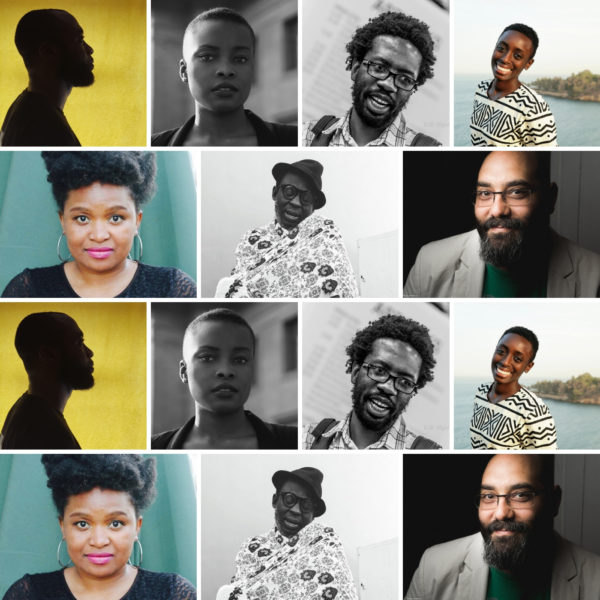
The shortlists for the 2018 Brittle Paper Awards were announced in October. Begun in 2017 to mark our seventh anniversary, the Awards aim to recognize the finest, original pieces of writing by Africans published online.
The $1,100 prize is split across five categories: the Brittle Paper Award for Fiction ($200), the Brittle Paper Award for Poetry ($200), the Brittle Paper Award for Creative Nonfiction ($200), the Brittle Paper Award for Essays & Think Pieces ($200), which for the first time includes an interview, and the Brittle Paper Anniversary Award ($300) for writing published on our blog. The winners will be announced on Monday, 19 November 2018.
Meet the Finalists for the 2018 Brittle Paper Award for Essays & Think Pieces
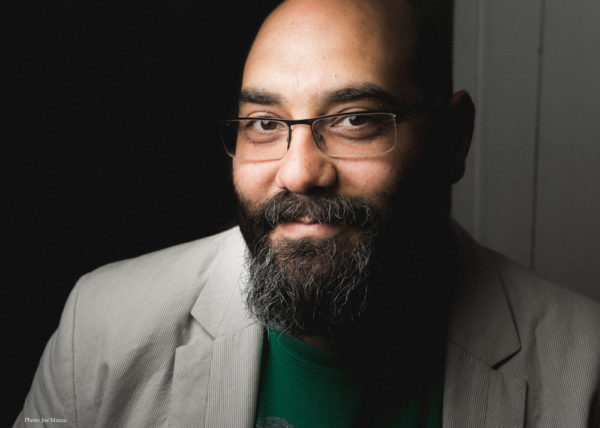
Matthew Shenoda (Egypt), for “Verse Africa: The Malleable Poetics of Some Contemporary African Poets,” in World Literature Today
Matthew Shenoda is a writer, professor, and university administrator. His debut collection of poems, Somewhere Else (Coffee House Press), was named one of 2005’s debut books of the year by Poets & Writers Magazine and was winner of a 2006 American Book Award. He is also the author of Seasons of Lotus, Seasons of Bone (BOA Editions Ltd.) and Tahrir Suite: Poems (TriQuarterly Books/Northwestern University Press), winner of the 2015 Arab American Book Award. With Kwame Dawes, he co-edited Bearden’s Odyssey: Poets Respond to the Art of Romare Bearden (TriQuarterly Books/Northwestern University Press, 2017) and Duppy Conqueror: New & Selected Poems.
Formerly Assistant Provost for Equity and Diversity at CalArts where he also taught in the School of Critical Studies as well as Dean of Academic Diversity, Equity, and Inclusion at Columbia College Chicago where he was Professor of English and Creative Writing, Shenoda taught at the College of Ethnic Studies at San Francisco State University and is currently the Vice President of Social Equity & Inclusion and Professor of Literary Arts and Studies at Rhode Island School of Design (RISD). A founding editor of the African Poetry Book Fund, his work has been supported by the California Arts Council and the Lannan Foundation, among others.
From “Verse Africa: The Malleable Poetics of Some Contemporary African Poets”:
We see how Wesley takes note of the lived realities and evolutions of civil war, of the subtle distinctions of what it means to be from a place completely transformed and ravaged by violence, and the lasting and personal invasions it causes. Emblematic of her aesthetic style, Wesley often pays attention to the ephemeral, the things both culturally symbolic and domestic, a line often blurred in many cultures. But what’s more is that she uses the framing set by the generations before her to create poetry that not only speaks to her realities as a Liberian woman and survivor of the civil war but a poetry that implicates her own grief, allowing her a fully humanized space on par with the works of anglophone writers from all over the world. In this vein Wesley, representative of a kind of “middle generation” between Aidoo and the emerging writers of today, helps break ground for a myriad of both content and style.
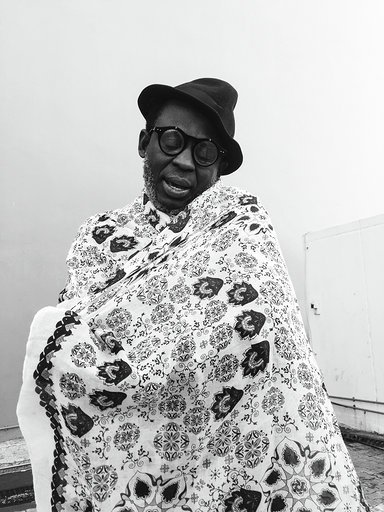
Bongani Madondo (South Africa), for “A Stranger in ‘the Village,’” in The Johannesburg Review of Books
Biographer, essayist, and African Speculative Fiction author, Bongani Madondo is an associate editor at The Johannesburg Review of Books. He is also the 2018/19 Writing Fellow at Wits Institute for Social and Economic Research. His latest book Sigh, the Beloved Country (Picador Africa) has been nominated for several international and local awards, including as a finalist for the University of Johannesburg 2017 Literary Awards. His futuristic allegory, “Red Skin Slayers,” was shortlisted for the Nommo Awards. His essay, “Writes of Passage: An Urban Memoir,” was shortlisted for the 2017 Brittle Paper Award for Essays. He writes on poetry, photography, and power in the social firmament.
From “A Stranger in ‘the Village,’”:
What comes to your mind when you hear these three words: The Village Voice? It’s a terribly uncool question to ask, in fact, simply because its loyal cadre of readers, cheeky and edgy, ageing, permanently dissatisfied—just like the rag itself once was, gloriously—simply refer to it as ‘the Voice’. For me, a geeked-out, acned-out black boy, bookish to a fault, turned down by all the girls as a reading bore with no game in his genes, a ‘weirdo’ blerd (black nerd) before these things went vogue, with an inexplicable devotion to punk and rock zines (NME!, Long Live Nick Kent!, arrest Julie Burchill for her superior wit! Even if you gift Morrissey ol’ country England itself as a birthday gift, he’ll remain sulky as fuck!), little of what was left of my un-scattered mind went: whose village? Whose voice?
Ah. It’s a New York weekly, you fool. How can you love punk but … but what … is that piece of … it’s not remotely punk. Perhaps it was once. I don’t know. And me and a few black nerds I knew, mostly my village’s fellow goth-heads, somehow resolved the contradiction and swore to read everything that came our way. We thought sinking into punk and goth’s darknesses would shed a light into our frustrated extended teens, and never mind the surrounding African society that saw us as, by going goth, desperately trying to pass for white. Still, we—at least I—was not quite where it was at. I knew and could debate Brit-punk, pop, new wave, psychedelia, metal and all that with anyone … all the while, of course, on some days, immersing myself into the requisite hip ‘negro’ zines, Rap Pages and The Source, before Vibe Magazine and XXL, just to add a little bit of brown sugar into the bowl. But I still had no idea what the heaven The Village Voice was until about 1994.
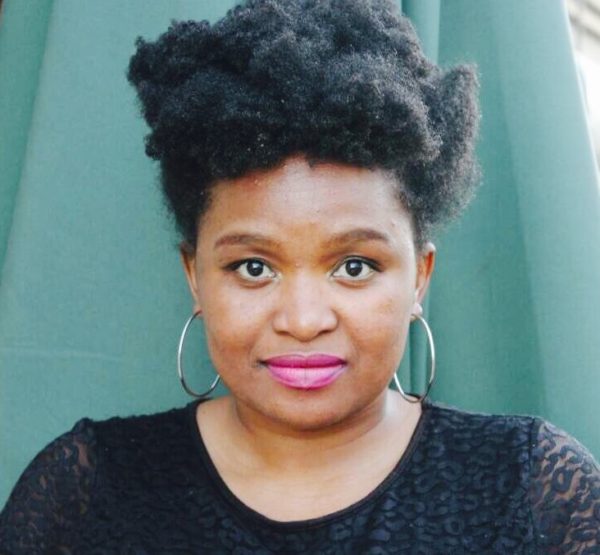
Gaamangwe Joy Mogami (Botswana), for “Preserving and Writing History,” a Conversation with Ayesha Harruna Attah (Ghana), in Africa in Dialogue
Gaamangwe Joy Mogami is a writer, transformational coach, and conversationalist from Gaborone, Botswana. Her poetry, essays, and interviews has been published in various literary magazines worldwide. She facilitates inner healing and transformation immersions and workshops. She is the curator and founding editor of Africa in Dialogue.
From “Preserving and Writing History”:
I agree, preserving the memories of the people who came before us is important because in someway, in many ways, we are an extension of the people and lives gone. Their experiences, what we call histories, are still very much alive, living with us, on a subliminal and in that collective unconscious level as per Carl Jung’s ideology, right? So I understand the urge to want to explore and preserve her story with such dignity. And that is what you did with the book. You showed a wholesome view of what life was like for these two women who were different, living within the two spectrum of the Salaga slave market, but eventually connected.
I resonated with Wurche. She was a warrior, doing things that were rare during her time. And I was in awe and also shattered by Aminah. Her ability to survive such perpetual states of trauma was just phenomenal. What inspired her creation? And how did writing the two women, one so close to you, affect and shift you?
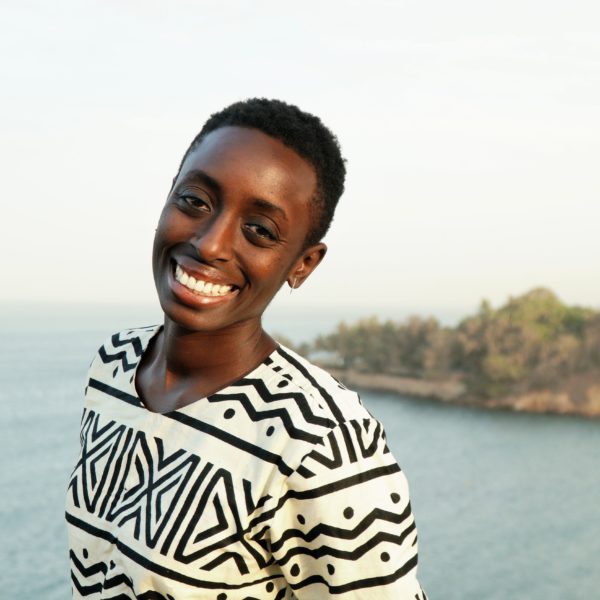
Ayesha Harruna Attah (Ghana), for “Preserving and Writing History,” a Conversation with Gaamangwe Joy Mogami (Botswana), in Africa in Dialogue
Ayesha Harruna Attah is the author of Harmattan Rain, nominated for the Commonwealth Writers’ Prize, Saturday’s Shadows, and The Hundred Wells of Salaga. Her writing has appeared in The New York Times Magazine, Slush Pile Magazine, Asymptote Magazine, and the Caine Prize Writers’ 2010 Anthology. She received the 2016 Miles Morland Foundation Scholarship for non-fiction, and shuttles back and forth between Senegal and Ghana.
From “Preserving and Writing History”:
Not that many people, at least in my generation, know of the war. I myself found out about it in 2012, so not that long ago. That said, it’s not just the legacy of the war that has had an effect on Salaga, which is now almost a ghost-town, but it’s that of slavery. Not only did slave-raiding lead to depopulation of most of the north, but it has also affected north-south relations in Ghana. People from the north are generally looked down upon and are often expected to take on menial jobs. On a personal note, having a parent from the north, who I think is the most brilliant man on earth, I’ve always wanted to understand why the stereotype (obviously false) existed.
But even more serious, I think, is the fact that in Ghana we don’t talk about our role in the slave trade and how some of the biggest ethnic groups were slave-owning and actively raided their neighbors. We started this conversation with connections from our past. This is a clear example of how trauma from the past could be rearing its head in our current lives; why stability on the continent seems elusive. Ghana, which is considered one of the most peaceful countries in Africa, every so often suffers from bouts of violence… guess where? In the north. And it’s usually between two ethnic groups. The way I see it, it’s because of the fear of one’s neighbors, a fear with deep, deep roots.
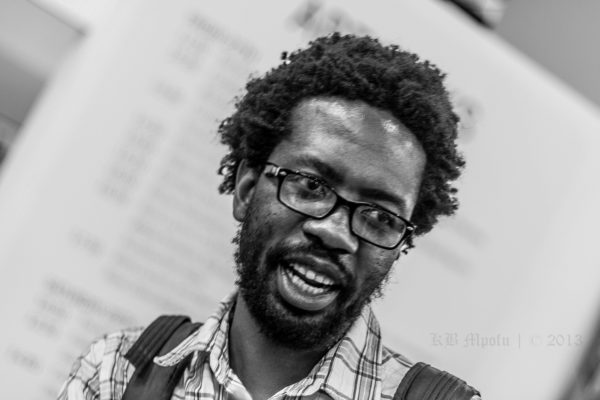
Percy Zvomuya (Zimbabwe), for “James Baldwin in Rhodesia,” in The Johannesburg Review of Books
Percy Zvomuya, an African writer, essayist and football fan, has written for many publications including Chimurenga, Mail & Guardian, Johannesburg Review of Books, The London of Review Books blog, and Al Jazeera.
From “James Baldwin in Rhodesia”:
The publication of Michael Raeburn’s Black Fire! Accounts of the Guerrilla War in Zimbabwe resulted, if for a moment, in a radical departure from the reactionary relationship of old between the USA and Rhodesia. I had been aware for some time of Black Fire!, five atmospheric, fictionalised accounts of historical moments from the armed struggle against Smith’s settler government, by Raeburn, a Zimbabwean writer and filmmaker. (Raeburn was at pains to refer to his sources, including court records, newspaper reports, interviews with the protagonists, and so on, so as to place his work within the ambit of history, but simultaneously deployed fictive techniques to tell the stories as vividly as possible.) Going through the contents, ‘The Crocodile Gang’ tells of a group of guerrillas who made incursions into Rhodesia for the purposes of sabotage and were involved in the killing of a white man—perhaps the first white casualty of the war; ‘Refusal’ is about a guerrilla who turns from believer to agnostic, in some ways anticipating the contradictions of the nationalist struggle; ‘The Spirit’ is about a guerrilla who hibernates in Rhodesia while he grapples with African spirituality and metaphysics and the consequences of war; ‘On the Move’ is, again, about guerrilla incursions into Matabeleland, in southwestern Zimbabwe, where the military wing of the Zimbabwe African People’s Union (Zapu), Zipra, sometimes partnered with South Africa’s uMkhonto weSizwe resistance soldiers; and finally, ‘Black Fire’, the title story, marks a departure from the random acts of banditry we witness in ‘The Crocodile Gang’, with the protagonists moving towards the adoption of more sophisticated guerrilla warfare tactics.
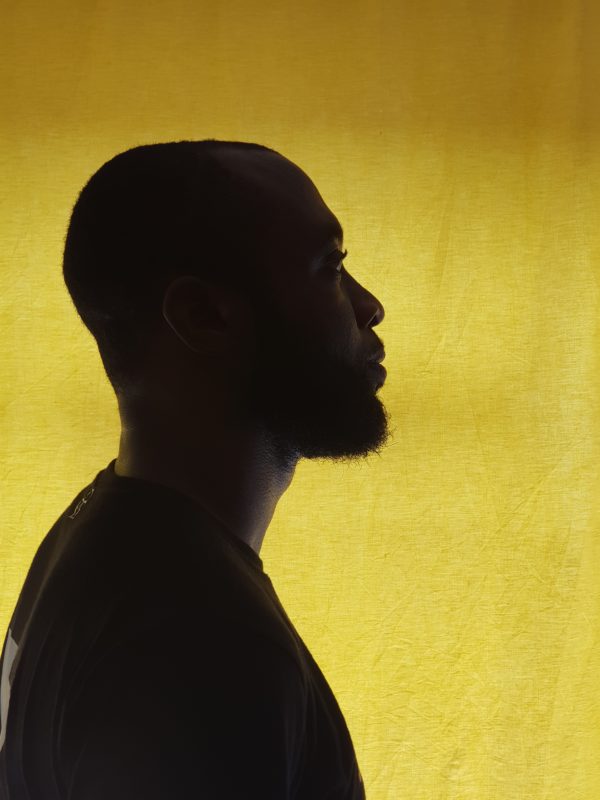
Emmanuel Iduma (Nigeria), for “The Colonizer’s Archive Is a Crooked Finger,” in Catapult
Emmanuel Iduma is the author of A Stranger’s Pose, a book of travel stories, and The Sound of Things to Come, a novel. Born and raised in Nigeria, his stories and essays on art appear frequently in journals, magazines, artists’ books, and exhibition catalogues. He received a 2017 Creative Capital/Warhol Foundation grant in arts writing, and is a faculty member at the School of Visual Arts, New York.
From “The Colonizer’s Archive Is a Crooked Finger”:
There is, below every name, the underbelly of a life. If it were possible, I would ask for people and things to go nameless until the dusk of their lives: humans at the outset of their last breath, plants crumpled by errant feet just before they fail to rise again, a beast in the final wince and gasp. That way, names can achieve their real intent: to summarize and give character to a life.
I see a vast number of people whose names I will never know, but whose lives are befittingly characterized by their poise and pose. The man who stands with an arm resting on a wall—I can estimate with what commitment he works. His hands touch the membrane of the wall as a herdsman touches the skin of a favorite sheep. The concrete is caressed. The mud is fingered. There is, even, desire in the reach of his hands. He loves all houses as he loves his own skin.
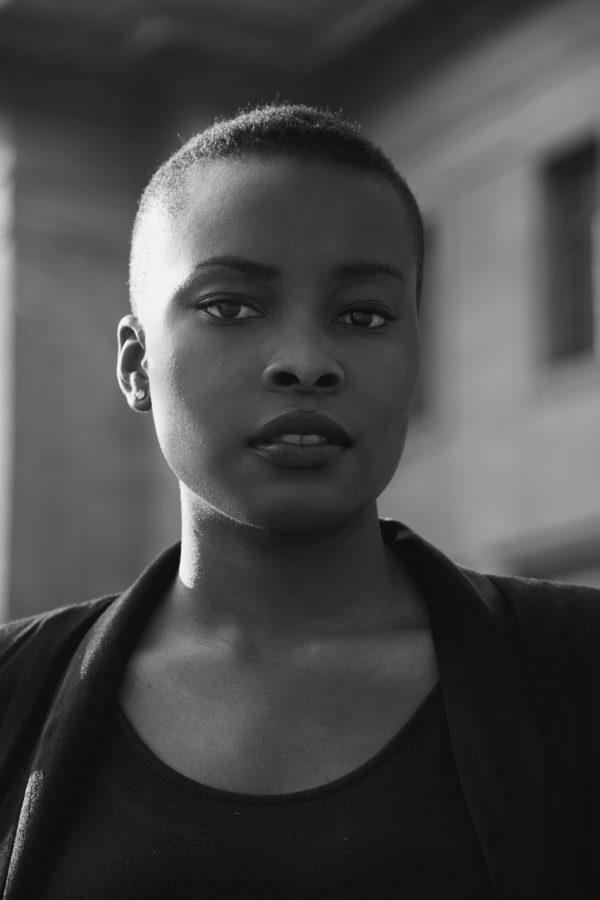
Panashe Chigumadzi (Zimbabwe & South Africa), for “History Through the Body or Rights of Desire, Rights of Conquest,” in The Johannesburg Review of Books
Panashe Chigumadzi was born in Zimbabwe and raised in South Africa. Her debut novel Sweet Medicine (Blackbird Books, 2015) won the 2016 K. Sello Duiker Literary Award. She is the founding editor of Vanguard magazine. A columnist for The New York Times and contributing editor to the Johannesburg Review of Books, her work has featured in titles including The Guardian, Chimurenga, Washington Post, and Die Ziet. Her second book, These Bones Will Rise Again, a reflection on Robert Mugabe’s ouster, was published in June 2018 by The Indigo Press. She is a doctoral candidate at Harvard University’s Department of African and African American Studies.
From “History Through the Body or Rights of Desire, Rights of Conquest”:
Disgrace presented something more destabilising for our group of ‘bornfrees’: a history located on our soil, in our times. Disgrace was ‘right here’, ‘right now’. It started off easily enough, although there was some excitement in the classroom as we began David’s story in the bedroom of an ‘exotic’ escort. The charge intensified as we felt the sense of being treated like the young adults we were, being let in on an affair between an aging professor and his impressionable student. David’s retreat to his ‘New Age’ ‘frontier farmer’ daughter’s piece of land in ‘old Kaffraria’ did not portend too much. The scenes were familiar enough, the only thing unusual for our adolescent class was his daughter Lucy’s sexuality, specifically her relationship with Helen. All proceeded well enough until three unknown black men arrived on their doorstep. The atmosphere changed. This is South Africa: we knew that danger loomed. In the aftermath of the intrusion, a charged silence coalesced around Lucy’s body.
Enquiries, about the shortlisted writers or for interviews with them, can be sent to [email protected].
READ: The 2018 Brittle Paper Award for Fiction: Meet the 5 Finalists
READ: The 2018 Brittle Paper Award for Poetry: Meet the 6 Finalists









The Queen Episode November 12, 2018 10:22
7 finalist are awesome baba